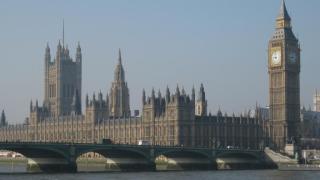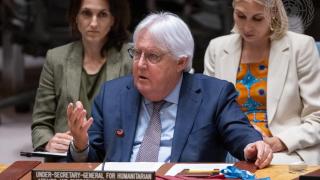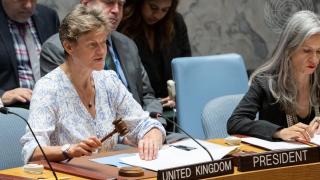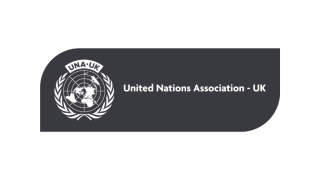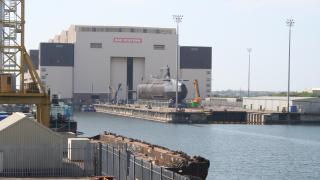
UNA-UK has joined with a large group of organisations (listed below) to urge the UK to use the upcoming Non-Proliferation Treaty (NPT) Preparatory Committee meeting to make progress on its international obligation to work in good faith for a world free of nuclear weapons.
Citing Izumi Nakamitsu, UN High Representative for Disarmament Affairs, the letter links the declining health of the NPT regime to the lack of visible progress on nuclear disarmament.
Last year non-nuclear weapons states negotiated a new, legally binding Treaty on the Prohibition Nuclear Weapons (TPNW) which the signatories to this letter urge the UK to acknowledge as a legitimate part of the international disarmament and non-proliferation architecture, and accordingly, to begin engaging constructively with this Treaty:
"As a country whose National Security Strategy and Strategic Defence and Security Review links the UK’s future security and prosperity to the health of the rules-based international system, the UK needs to ensure it acts to strengthen, not undermine, this system. Irrespective of the UK’s position, the rules-based international system now unquestionably includes the Treaty on the Prohibition of Nuclear Weapons (TPNW). In that context we would point out that the TPNW, as is made clear in its Preamble, is firmly anchored within international humanitarian law. Consequently, the UK should announce its intention to start constructively engaging with the TPNW, including through a commitment to attend future Meetings of States Parties as an observer."The letter also highlights the dangerous steps taken by Russia and the US in adopting more aggressive nuclear postures and, in this regard, expresses "deep disappointment" in the UK's response to "welcome" the recent US Nuclear Posture Review and asks the UK to clarify the steps it intends to take to ensure that its ally steps back from policies that will undermine the NPT regime.
Finally, the letter calls on the UK to take all opportunities to cooperate with states on efforts to bring about nuclear security and disarmament, including those presented by the UN High Level International Conference on Nuclear Disarmament, scheduled for May 2018.
Joint letter to the Secretary of State for Foreign Affairs on nuclear disarmament
The Rt Hon. Boris Johnson MPSecretary of State
Foreign & Commonwealth Office
King Charles St
London SW1A 2AH
16 April 2018
Dear Secretary of State,
We are writing to urge the UK to use the imminent Non-Proliferation Treaty (NPT) Preparatory Committee meeting to recognise and act upon the UK’s international obligation to work for a world free of nuclear weapons.
As you will be aware, disarmament is a fundamental pillar of the NPT regime. However, the widespread feeling that the NPT’s Nuclear Weapons States (NWS) are neglecting their disarmament obligations recently led the UN’s High Representative for Disarmament Affairs to link the lack of visible progress on disarmament to the declining health of the NPT regime. Izumi Nakamitsu stated in a recent meeting at Parliament that only demonstrable progress towards nuclear weapons states’ implementing their obligation under Article 6 to negotiate in good faith towards disarmament can “ensure the long-term viability of the Treaty.”[1]
Little progress has been demonstrated to the international community on the steps towards disarmament agreed in the NPT’s 2000 and 2010 Action Plans. At the same time, the NWS have been taking steps to modernise their arsenals - tolerating the risks of global devastation through accident, mistake or cyber-attack - with Russia and the US also adopting more aggressive nuclear postures. For example, both states have rejected ICBM de-alerting, and have placed emphasis on ‘lower yield’ nuclear weapons[2] and their ‘usability’ in recent policy announcements. These represent not only a dangerous development but also a set of policies that are clearly opposed to NPT commitments. We were therefore deeply disappointed to see the UK government “welcome” the recent US Nuclear Posture Review,[3] and we ask what steps the government will take to ensure that our close ally steps back from policies that will undermine the NPT regime.
There is clearly an urgent need for states to build common ground on disarmament. Steps should be taken by the UK to build bridges with Non-Nuclear Weapons States (NNWS), which must include signalling unmistakable progress towards the UK’s obligation to disarm. They must also include acceptance of, and engagement with, the new realities in the international non-proliferation and disarmament architecture.
As a country whose National Security Strategy and Strategic Defence and Security Review links the UK’s future security and prosperity to the health of the rules-based international system, the UK needs to ensure it acts to strengthen, not undermine, this system. Irrespective of the UK’s position, the rules-based international system now unquestionably includes the Treaty on the Prohibition of Nuclear Weapons (TPNW). In that context we would point out that the TPNW, as is made clear in its Preamble, is firmly anchored within international humanitarian law. Consequently, the UK should announce its intention to start constructively engaging with the TPNW, including through a commitment to attend future Meetings of States Parties as an observer.
Such a participatory policy could minimise misconceptions about the TPNW and the continued importance of the NPT to states. Many UK allies will now be pursuing additional and mutually reinforcing work under the TPNW, towards common goals on non-proliferation and disarmament that are described within the NPT and other treaties.
Participation would also provide an opportunity for the UK to contribute towards these goals by offering expertise to discussions and processes on subjects such as verification, and measures to assist individuals and remediate environments affected by nuclear weapons - given our history of nuclear testing, which continues to carry a legacy of harm.
Such an approach would send an important signal to NNWS that the UK is taking seriously their legitimate concerns about the catastrophic humanitarian impact of nuclear weapons and the urgent need for disarmament, which led to the negotiation of the TPNW. Within the UK, the Scottish Government and Parliament share the views of the UN member states that adopted the TPNW. The Scottish Government and Parliament’s constructive participation in the UK’s engagement with these allies should be welcomed by the UK Government.
An additional opportunity to cooperate with states on efforts to bring about nuclear disarmament, the UN High Level International Conference on Nuclear Disarmament, takes place in May 2018. We urge the UK to attend this meeting at ministerial level or above and to use the opportunity to develop relations with NNWS and make progress on the UK’s disarmament obligations.
If the UK is to live up to its aspirations of a Global Britain, the UK cannot cherry-pick those forums for multilateralism that the government is most comfortable dealing with and ignore others. By adopting a policy of engagement and supporting the system as a whole, the UK can strengthen international cooperation at a time when the risks posed by nuclear weapons are considerable and arguably growing. We urge the UK to take all opportunities to work constructively towards the common goal of a world without nuclear weapons.
Yours sincerely,
Philip Austin, Coordinator, Northern Friends Peace Board
Chris Butler, Yorkshire Campaign for Nuclear Disarmament
Francis Brienen, Deputy General Secretary (Mission), United Reformed Church
Arthur Chapman, Chair, and Brian Larkin, Coordinator Edinburgh Peace & Justice Centre
Tim Devereux, Chair, Movement for the Abolition of War
Ben Donaldson, Head of Campaigns, United Nations Association – UK
Dr Gari Donn, Convenor, UNA Scotland and Executive Director, UN House Scotland
Janet Fenton, ICAN Liaison Scotland/ WILPF Scottish Branch
Pat Gaffney, General Secretary, Pax Christi UK
Cllr Ernie Galsworthy, Chair and Cllr David Blackburn, English Forum Chair, Nuclear Free Local Authorities, UK and Ireland
Robert Harrap, General Director, Soka Gakkai International – UK
Dr Stephen Herman, Director, Multifaith Committee on Shared Security, Religions for Peace (UK)
Andy Hinton, Aberdeen and District Campaign for Nuclear Disarmament
Steve Hucklesby, Policy Adviser (International Affairs), The Methodist Church
Dr Rebecca E. Johnson, Executive Director, Acronym Institute for Disarmament Diplomacy
Brian Jones, Vice Chair, Campaign for Nuclear Disarmament Cymru
Bill Kidd MSP, Convenor, Scottish Parliament CPG Nuclear Disarmament
Gina Langton, 80,000 Voices
Fiona MacGregor, Hastings Against War
David Mackenzie, Trident Ploughshares in Scotland
Dr Judith McDonald, Coordinator, Medact Scotland
Anne Milne, Edinburgh Campaign for Nuclear Disarmament
Elizabeth Minor, Advisor, Article 36
Dr Sophie Neuburg, Executive Director, Medact
Paul Parker, Recording Clerk of Quakers in Britain
Oliver Robertson, Fellowship of Reconciliation
Paula Shaw, Women’s International League for Peace and Freedom, UK
Martin Tiller, Co-Chair, Christian Campaign for Nuclear Disarmament
Dave Webb, Chair, Campaign for Nuclear Disarmament
Dr Philip Webber, Scientists for Global Responsibility
Arthur West, Scottish Campaign for Nuclear Disarmament
[1] UNA UK, ‘UN disarmament chief urges states to build common ground on nuclear disarmament,’ 5 February 2018 https://www.una.org.uk/news/un-disarmament-chief-urges-states-build-common-ground-nuclear-disarmament?page=3
[2] These weapons are in fact similar in size to those used in Hiroshima and Nagasaki
[3] USA: Nuclear Weapons: Written question - HL6250, https://www.parliament.uk/business/publications/written-questions-answers-statements/written-question/Lords/2018-03-12/HL6250
Image: British nuclear submarine HMS Astute, credit: Wikimedia Commons

